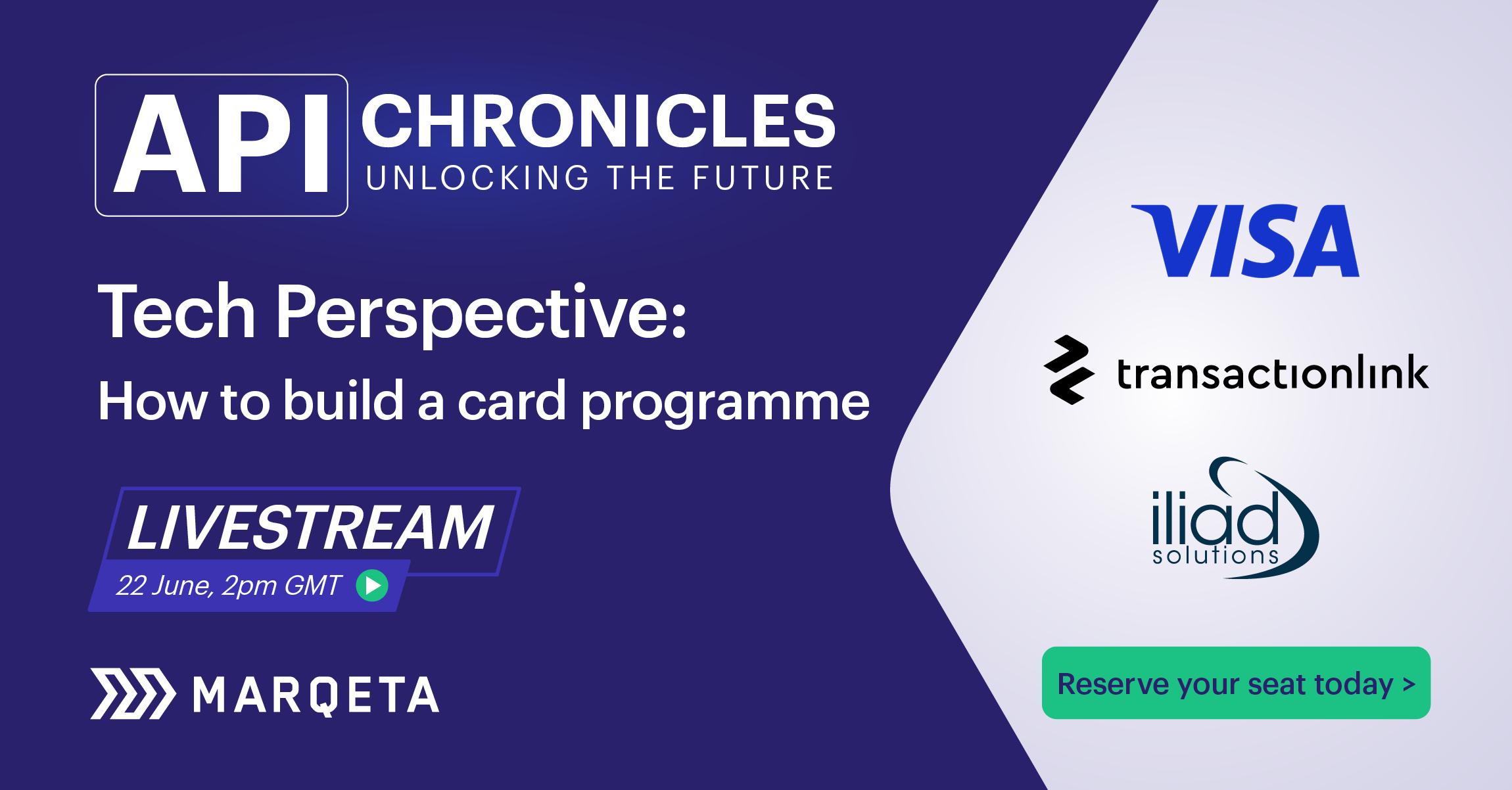Talking tech: what innovators need to know about building a modern payment card
If you want to build a card programme but aren’t sure where to start, there’s a very good chance that Marqeta’s latest API Chronicles livestream will be an hour of your time very well spent. We gathered three experts on building modern payments products to discuss the various considerations facing innovators thinking about offering their customers a payment card.
In a highly informative discussion, Anthony Walton, CEO of Iliad Solutions, Emma Kerr, Visa’s SVP for Europe Strategic Partnerships, and Mateusz Pniewski, CEO of TransactionLink, imparted a series of tech gems you’d be wise not to miss.
The conversation was hosted by mmob’s brilliant Senior Partnerships Manager Olivia Minnock and began with a very straightforward question: “Why a card programme and why now?”
Payment cards: delivering transactional value and customer loyalty
For Emma, there were “two primary reasons” - the first being about gaining a share of transactional value and the second an opportunity to boost customer loyalty and engagement. She went on to say that a card was “one of the best ways to have a touch point with the consumer. And I think because there's more and more noise in the app space and every part of our lives, having that touch point is really, really valuable.”
With that thought in mind, it was encouraging to learn that launching a card had become much easier, faster and safer. According to Anthony, aspects of the process like getting a BIN sponsor and security checks “took forever” 10 years ago.
“The process was much more clunky but there’s been a big change in the last five years. And this just opens up the market for people doing this kind of thing for whatever kind of reason,” he said.
From a B2B card programme perspective, Mateusz said there was rapidly growing interest on the Continent for “stepping up the game” for SMBs and startups. “It’s picked up pace after the Silicon Valley Bank collapse … what we can see is a lot of adjacent markets that are looking into actually offering card programmes, and it’s often just about facilitating the activity of using a card in the first place.”
The discussion then moved on to the topic of risk, with Mateusz arguing that business cards were “more complicated” than consumer cards, because of “sophisticated connections” between entities.
“In the B2B world, the risks are much more operational. Whereas with consumers, the risk profile is about ‘Hey, are we dealing with an AI-generated face now’ or other kinds of stuff. And I think that's the biggest difference today,” he said.
Considerations for partnering: ecosystem expertise versus scalability
The panel also looked at some key considerations for launching a payment card, with Anthony leading the debate: “There are two things - the first is obviously there's not one solution to this problem, and whatever niche you're in, there are differences between B2B and B2C.
“Secondly, you need to know how you wish to scale. It's easy to sandbox things and get them working but if you're looking to scale for a significant amount of transactions, it's very important to figure out what the size will be before you start down the road.”
In Emma’s opinion, innovators should “think about how much time you want to spend setting up all the ‘end to end’ that is required to launch any card programme.”
She continued: “You've got a variety of players that you're going to need to connect with, for example the issuer processor, BIN sponsors, programme managers, and anybody offering a fraud tool.”
Emma added that there was a series of questions innovators needed to ask such as “how much time do you want to spend becoming intimately familiar with those players and stitching them together? Or, how much does speed to market matter to you?”
Answering these questions, she explained, would help define whether a programme would be better placed working with a one-stop shop of solutions or whether it could go bespoke - meaning the card programme owner is sufficiently experienced to take control of the various ecosystem relationships and functions.
This brought us neatly to the topic of getting advice, something on which Mateusz was clear: “It’s not the technology that is the challenge these days.” Rather, the skill is in understanding where your product will add value and how quickly it can grow.
Thankfully, the fintech world is largely a community of people willing to help each other - a point illustrated by Emma who said: “If folks are interested in learning more, we're always happy to pick up the phone and explain what we know about the landscape and put you in touch with folks from across the entire network.”
However, Mateusz returned to the point of technology, describing how Marqeta’s documentation can take partners seamlessly from a “zero to 60%” understanding of the ecosystem. “If you map out all the endpoints the API is talking to, you can understand what you need and how the process works.”
He went on: “For things like risk, there are lots of great consultants out there who’ve worked with phenomenal startups and who want to share knowledge and make it public.”
Beyond plastic: the right credentials for a new generation of payments
Another fascinating area of discussion centred around the fact that card no longer just means plastic. Thanks to the rise of smartphones, tokenization has become a key consideration for any innovator.
On this point, Emma said: “When we talk about cards, it's not plastic. It's the credentials and how many places can those credentials sit. For example, if you're going to tap to pay at the turnstile to get into the Underground, you're most likely going to use your phone. So the question is, is the card able to be tokenized and can you put it into other digital wallets?”
She added: “Tokenization is really important not only because it enables those digital use cases to come alive, but also because it removes the sensitive data component. So it removes the ability for anybody to take that 16-digit number and use it on an e-commerce report.”
Later on, the conversation touched on regulation, and Anthony felt that services like AML (anti money laundering) would require some sort of accreditation in the future, adding that “we're in the early days of this evolution”.
Mateusz agreed, likening the journey of regulatory oversight to that of computer virus protection. “Regulation will keep evolving like antivirus software.”
This led to a discussion on APIs and how they have changed the card landscape, with Anthony describing the importance of ensuring accuracy across calls to different endpoints.
“Open API standards have been one of the biggest transformations of payments in the past 20 years and they’ve enabled more people to participate in the industry,” he said, before cautioning: “If there’s a failure in any one of those API calls that gives you a false response of a credential that's not quite accredited, and then you pass it on to the next API call, you can get into an awful lot of trouble.
“It all comes back to trust and and you shouldn’t consume an API from someone you don’t know.”
While this all might sound daunting for the uninitiated, Mateusz had some sage advice for new entrants:
“Don't get discouraged but equally don't assume that by the end of August ‘we're gonna deliver and it's gonna go live’. That's never happened and that’s normal. Embrace the fact that this is complicated. And it's complicated because it needs to be. You need to kind of see it in action and see what your particular customer segment is dealing with, and then take an iterative process or use a tool that allows you to come back and redesign things - because we never get it completely right the first time.”
That said, with the right partners building a card programme nowadays is much easier - thanks to the availability of reliable API technology, ecosystem partners who take the pain out of building payment cards, and a community of friendly people willing to provide advice.
If you’re at the start of that journey, you’ll really enjoy the Tech Perspective: how to build a card programme API Chronicles livestream, which can be viewed in full here.

